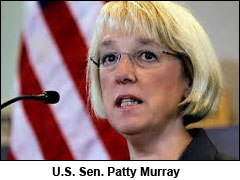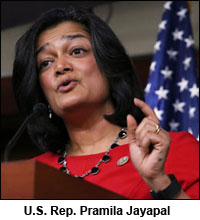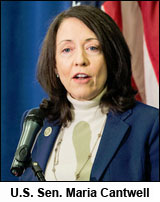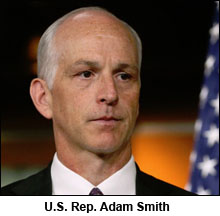NATIONAL
State’s Democrats in Congress aim to shore up union rights
PRO Act introduced to strengthen workers’ power to join together, bargain
 WASHINGTON, D.C. (May 3, 2019) — On Thursday, Sen. Patty Murray (D-WA), top Democrat on the Senate labor committee; Sen. Maria Cantwell (D-WA); and Reps. Pramila Jayapal (D-WA/7) and Adam Smith (D-WA/9) joined colleagues in the Senate and House to introduce the Protecting the Right to Organize (PRO) Act. This comprehensive labor legislation would strengthen workers’ right to organize a union and bargain for higher wages, better benefits, and safer working conditions.
WASHINGTON, D.C. (May 3, 2019) — On Thursday, Sen. Patty Murray (D-WA), top Democrat on the Senate labor committee; Sen. Maria Cantwell (D-WA); and Reps. Pramila Jayapal (D-WA/7) and Adam Smith (D-WA/9) joined colleagues in the Senate and House to introduce the Protecting the Right to Organize (PRO) Act. This comprehensive labor legislation would strengthen workers’ right to organize a union and bargain for higher wages, better benefits, and safer working conditions.
As wage inequality continues to leave workers and middle-class families behind, this legislation would empower millions of Americans to stand together and ensure hardworking people are getting their fair share of economic growth. A recent study published in the National Bureau of Economic Research found that unions have consistently provided workers with a 10- to 20-percent wage boost over their non-union counterparts over the past eight decades.
 “Unions helped create the middle class in this country, but decades of attacks by corporate special interests have left many workers struggling to make ends meet and without a voice to advocate for themselves,” Murray said. “Our economy should work for everyone, not just corporate CEOs and billionaires — and that’s why I’m proud to introduce the PRO Act to strengthen workers’ bargaining power and their right to join a union to advocate for safer working conditions, better pay, and a secure retirement.”
“Unions helped create the middle class in this country, but decades of attacks by corporate special interests have left many workers struggling to make ends meet and without a voice to advocate for themselves,” Murray said. “Our economy should work for everyone, not just corporate CEOs and billionaires — and that’s why I’m proud to introduce the PRO Act to strengthen workers’ bargaining power and their right to join a union to advocate for safer working conditions, better pay, and a secure retirement.”
 “Under GOP rule, we have seen countless policy changes that have resulted in an economy of inequality and instability for our country’s most vulnerable workers,” Jayapal said. “The Protecting the Right to Organize Act will help reverse the years of damage done by policies stripping workers of their right to unite and bargain for themselves. I am proud to co-lead this legislation that will restore fairness to an economy that has turned its back on the lower class and strengthen federal laws to protect workers’ rights.”
“Under GOP rule, we have seen countless policy changes that have resulted in an economy of inequality and instability for our country’s most vulnerable workers,” Jayapal said. “The Protecting the Right to Organize Act will help reverse the years of damage done by policies stripping workers of their right to unite and bargain for themselves. I am proud to co-lead this legislation that will restore fairness to an economy that has turned its back on the lower class and strengthen federal laws to protect workers’ rights.”
 “In Washington state, we know the power of unions and organized labor first-hand,” Cantwell said. “We have the best workers in the world, who consistently prevail even when the deck is stacked against them. The working men and women of the United States are the reason why our country’s economic productivity is the envy of the world. Today, as too many middle-class families struggle to make ends meet and too many people work long hours for too little pay, we need to strengthen collective bargaining and support working families.”
“In Washington state, we know the power of unions and organized labor first-hand,” Cantwell said. “We have the best workers in the world, who consistently prevail even when the deck is stacked against them. The working men and women of the United States are the reason why our country’s economic productivity is the envy of the world. Today, as too many middle-class families struggle to make ends meet and too many people work long hours for too little pay, we need to strengthen collective bargaining and support working families.”
 “Labor unions and collective bargaining rights have and continue to play a crucial role in supporting our nation’s workers and shaping the backbone of America’s strong middle class,” Smith said. “I am proud to introduce The PRO Act with my colleagues because it is more important than ever that we protect workers’ rights to organize and collectively bargain. Doing so is crucial to combating increasing economic inequality, protecting workers’ well-being, creating new living wage jobs, and ensuring that today’s and future workers can build better life for themselves and their families.”
“Labor unions and collective bargaining rights have and continue to play a crucial role in supporting our nation’s workers and shaping the backbone of America’s strong middle class,” Smith said. “I am proud to introduce The PRO Act with my colleagues because it is more important than ever that we protect workers’ rights to organize and collectively bargain. Doing so is crucial to combating increasing economic inequality, protecting workers’ well-being, creating new living wage jobs, and ensuring that today’s and future workers can build better life for themselves and their families.”
Specifically, the PRO Act would:
● Establish penalties on predatory corporations that violate workers’ rights, and combat misclassification of workers as supervisors and independent contractors.
● Strengthen workers’ right to strike for basic workplace improvements, including higher wages and better working conditions.
● Create a mandatory mediation and arbitration process to ensure corporations and newly formed unions reach a first contract.
● Authorize unions and employers to negotiate agreements that allow unions to collect fair-share fees that cover the costs of representation.
● Streamline the National Labor Relation Board’s (NLRB) procedures to secure worker freedoms and effectively prevent violations.
● Protect the integrity of union elections against coercive captive audience meetings.
The PRO Act is endorsed by AFL-CIO; International Brotherhood of Teamsters; Service Employees International Union; Communications Workers of America; International Brotherhood of Electrical Workers; United Steelworkers; AFSCME; United Food and Commercial Workers International; American Federation of Musicians; United Association of Journeymen and Apprentices of the Plumbing and Pipe Fitting Industry; International Longshoremen’s Association; Professional Aviation Safety Specialists; International Association of Sheet, Metal, Air, Rail and Transportation Workers; American Federation of Government Employees; International Organization of Masters, Mates & Pilots; Department for Professional Employees, AFL-CIO; Brotherhood of Railroad Signalmen; Utility Workers Union of America, International Longshore and Warehouse Union, Screen Actors Guild-American Federation of Radio and Television Artists; Guild of Italian American Actors.
To read the fact sheet of the PRO Act, click here.
To read the section by section on the PRO Act, click here.
To read the full text of the PRO Act, click here.





